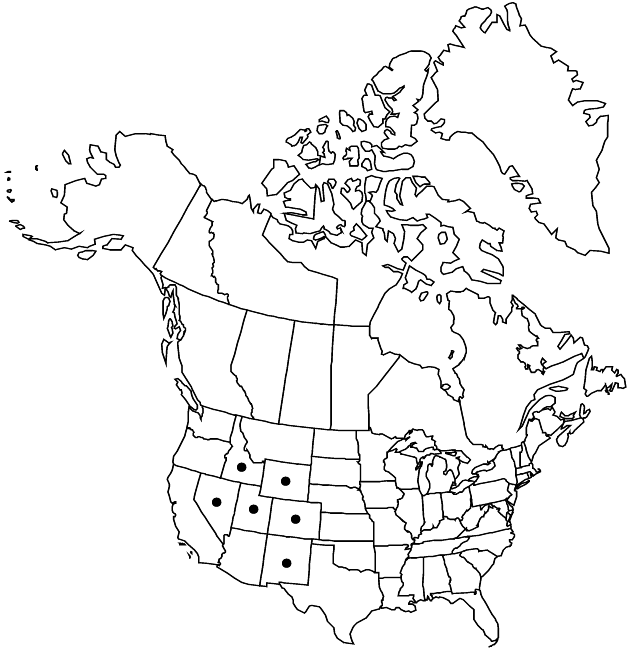Difference between revisions of "Packera crocata"
Phytologia 49: 46. 1981.
FNA>Volume Importer |
imported>Volume Importer |
||
| (5 intermediate revisions by 2 users not shown) | |||
| Line 8: | Line 8: | ||
}} | }} | ||
|common_names=Saffron ragwort | |common_names=Saffron ragwort | ||
| − | |basionyms={{Treatment/ID/ | + | |special_status={{Treatment/ID/Special_status |
| + | |code=E | ||
| + | |label=Endemic | ||
| + | }} | ||
| + | |basionyms={{Treatment/ID/Basionym | ||
|name=Senecio crocatus | |name=Senecio crocatus | ||
|authority=Rydberg | |authority=Rydberg | ||
| + | |rank=species | ||
| + | |publication_title=Bull. Torrey Bot. Club | ||
| + | |publication_place=24: 299. 1897, | ||
}} | }} | ||
|synonyms={{Treatment/ID/Synonym | |synonyms={{Treatment/ID/Synonym | ||
|name=Senecio pyrrhochrous | |name=Senecio pyrrhochrous | ||
|authority=Greene | |authority=Greene | ||
| + | |rank=species | ||
}} {{Treatment/ID/Synonym | }} {{Treatment/ID/Synonym | ||
|name=Senecio tracyi | |name=Senecio tracyi | ||
|authority=Rydberg | |authority=Rydberg | ||
| + | |rank=species | ||
}} | }} | ||
|hierarchy=Asteraceae;Asteraceae tribe Senecioneae;Packera;Packera crocata | |hierarchy=Asteraceae;Asteraceae tribe Senecioneae;Packera;Packera crocata | ||
| Line 42: | Line 51: | ||
-->{{#Taxon: | -->{{#Taxon: | ||
name=Packera crocata | name=Packera crocata | ||
| − | |||
|authority=(Rydberg) W. A. Weber & Á. Löve | |authority=(Rydberg) W. A. Weber & Á. Löve | ||
|rank=species | |rank=species | ||
| Line 56: | Line 64: | ||
|publication title=Phytologia | |publication title=Phytologia | ||
|publication year=1981 | |publication year=1981 | ||
| − | |special status= | + | |special status=Endemic |
| − | |source xml=https:// | + | |source xml=https://bitbucket.org/aafc-mbb/fna-data-curation/src/2e0870ddd59836b60bcf96646a41e87ea5a5943a/coarse_grained_fna_xml/V19-20-21/V20_1296.xml |
|tribe=Asteraceae tribe Senecioneae | |tribe=Asteraceae tribe Senecioneae | ||
|genus=Packera | |genus=Packera | ||
Latest revision as of 19:59, 5 November 2020
Perennials, 20–60+ cm; perennating bases horizontal to ascending (relatively long and stout). Stems usually 1, rarely 2–3, clustered, glabrous. Basal leaves (and proximal cauline) petiolate (petioles narrow); blades narrowly lanceolate or ovate to oblong-ovate, 20–60+ × 10–40+ mm, bases abruptly contracted to tapering, margins subentire to crenate-dentate. Cauline leaves gradually reduced (sessile, weakly clasping; lanceolate to oblong or sublyrate, often pinnately lobed). Heads 7–15+ in open, corymbiform arrays. Peduncles ebracteate or bracteate (bractlets inconspicuous), glabrous. Calyculi 0 or inconspicuous. Phyllaries 13 or 21, light green (or tips cyanic), 4–8 mm, glabrous. Ray florets 8 or 13; corolla laminae (deep yellow to orange-red) 6–8+ mm. Disc florets 60–80+; corolla tubes 4.5–5.5 mm, limbs 2.5–3.5 mm. Cypselae 1–1.5 mm, glabrous; pappi 3–5 mm. 2n = 46.
Phenology: Flowering early Jul–mid Aug.
Habitat: Wet meadows, along trails, rocky outcrops
Elevation: 1800–3500 m
Distribution

Colo., Idaho, Nev., N.Mex., Utah, Wyo.
Discussion
Packera crocata is characterized by deep yellow to reddish orange corollas. Some collectors have noted that there may be evidence for hybridization between P. crocata and P. dimorphophylla; the relationship between the two species needs further study.
Selected References
None.